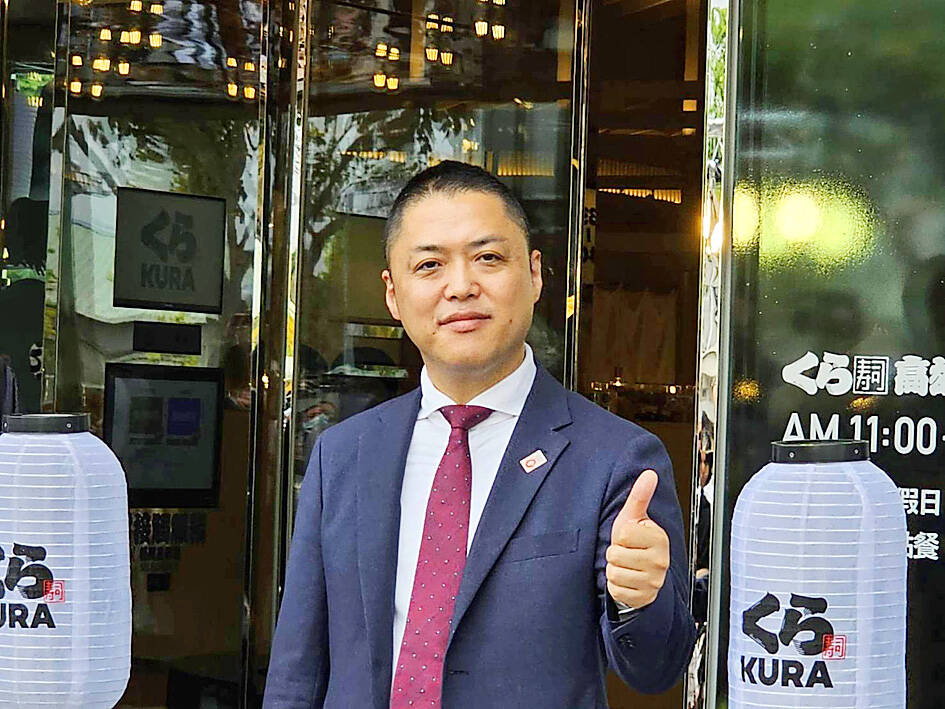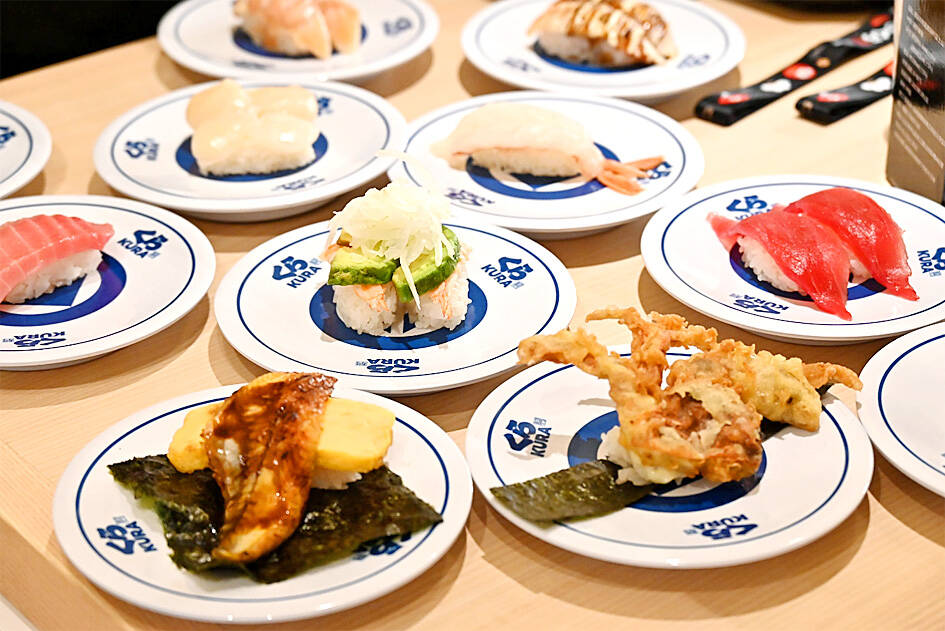Japanese revolving sushi bar restaurant chain Kura Sushi yesterday opened its first overseas flagship restaurant in Kaohsiung. It is also the chain’s 51st outlet in Taiwan.
With an area of 2,000 ping (6,612m2), the flagship restaurant is the largest Kura Sushi outlet in the world, accommodating 288 customers, said Kura Sushi Asia Co (亞洲藏壽司), the company’s Taiwanese subsidiary.
The restaurant designed by Kasiwa Sato combines sightseeing and food, and features 100 Japanese-style lanterns at the front of the outlet, Kura Sushi Asia said.

Photo: CNA
The chain arrived in Taiwan in 2014 with the goal of opening 50 restaurants, a target achieved in January, Kura Sushi Asia chairman Kentaro Nishikawa said.
Kura Sushi has opened four global flagship restaurants in Tokyo and Osaka, and is launching its first overseas flagship outlet in Kaohsiung as it is upbeat about an anticipated boom in the local tourism, and food and beverage industries, the company said.
The conveyor belt sushi chain has 530 restaurants in Japan, 46 in the US, 51 in Taiwan and is set to open its first outlet in Shanghai this year, Nishikawa said.

Photo: Lee Hui-chou, Taipei Times
While many restaurants withdrew from China due to its strict COVID-19 restrictions over the past few years, Kuro Sushi considers it a potential market for business growth and plans to open more stores there, he said.
The firm aims to increase its number of overseas restaurants to 400 by 2030, he added.

Hon Hai Precision Industry Co (鴻海精密) yesterday said that its research institute has launched its first advanced artificial intelligence (AI) large language model (LLM) using traditional Chinese, with technology assistance from Nvidia Corp. Hon Hai, also known as Foxconn Technology Group (富士康科技集團), said the LLM, FoxBrain, is expected to improve its data analysis capabilities for smart manufacturing, and electric vehicle and smart city development. An LLM is a type of AI trained on vast amounts of text data and uses deep learning techniques, particularly neural networks, to process and generate language. They are essential for building and improving AI-powered servers. Nvidia provided assistance

GREAT SUCCESS: Republican Senator Todd Young expressed surprise at Trump’s comments and said he expects the administration to keep the program running US lawmakers who helped secure billions of dollars in subsidies for domestic semiconductor manufacturing rejected US President Donald Trump’s call to revoke the 2022 CHIPS and Science Act, signaling that any repeal effort in the US Congress would fall short. US Senate Minority Leader Chuck Schumer, who negotiated the law, on Wednesday said that Trump’s demand would fail, while a top Republican proponent, US Senator Todd Young, expressed surprise at the president’s comments and said he expects the administration to keep the program running. The CHIPS Act is “essential for America leading the world in tech, leading the world in AI [artificial

DOMESTIC SUPPLY: The probe comes as Donald Trump has called for the repeal of the US$52.7 billion CHIPS and Science Act, which the US Congress passed in 2022 The Office of the US Trade Representative is to hold a hearing tomorrow into older Chinese-made “legacy” semiconductors that could heap more US tariffs on chips from China that power everyday goods from cars to washing machines to telecoms equipment. The probe, which began during former US president Joe Biden’s tenure in December last year, aims to protect US and other semiconductor producers from China’s massive state-driven buildup of domestic chip supply. A 50 percent US tariff on Chinese semiconductors began on Jan. 1. Legacy chips use older manufacturing processes introduced more than a decade ago and are often far simpler than

Gasoline and diesel prices this week are to decrease NT$0.5 and NT$1 per liter respectively as international crude prices continued to fall last week, CPC Corp, Taiwan (CPC, 台灣中油) and Formosa Petrochemical Corp (台塑石化) said yesterday. Effective today, gasoline prices at CPC and Formosa stations are to decrease to NT$29.2, NT$30.7 and NT$32.7 per liter for 92, 95 and 98-octane unleaded gasoline respectively, while premium diesel is to cost NT$27.9 per liter at CPC stations and NT$27.7 at Formosa pumps, the companies said in separate statements. Global crude oil prices dropped last week after the eight OPEC+ members said they would